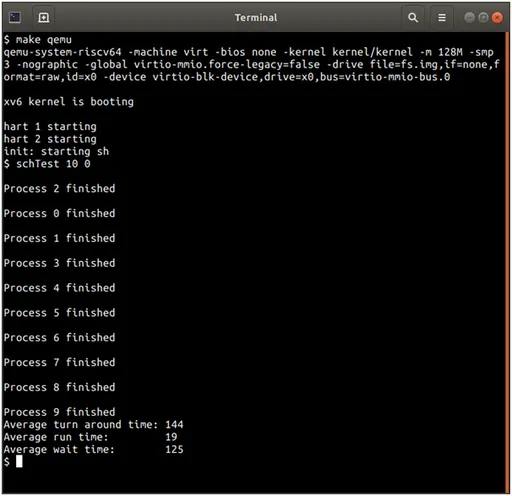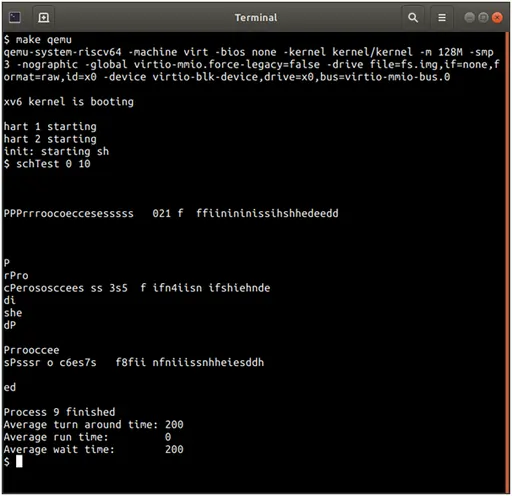Instructions
Objective
Write a C language assignment program to add first come first serve scheduler to XV6 OS.
Requirements and Specifications
First-Come-First-Server (FCFS) Scheduler
For this part of the project, we will modify the xv6 scheduler from strict round-robin to a firstcome-first-server (FCFS) scheduler. This will involve using the creation time entrying in the process control block that was added in part A. We will modify the scheduler function (kernel/proc.c). Scheduler will first have to find a RUNNABLE process with the earliest creation time. The process with the earliest arrival time is the process with the highest priority and therefor the process that is selected for execution. Only when the currently RUNNING process terminates is another process selected to RUN. It is suggested that you comment out the original round-robin scheduler code before adding your new version of the scheduler. This will allow you to switch back for testing in preparation for the final report.
Screenshots of output


Source Code
#include
#include
#include
#include
#include
#include
#define stat xv6_stat // avoid clash with host struct stat
#include "kernel/types.h"
#include "kernel/fs.h"
#include "kernel/stat.h"
#include "kernel/param.h"
#ifndef static_assert
#define static_assert(a, b) do { switch (0) case 0: case (a): ; } while (0)
#endif
#define NINODES 200
// Disk layout:
// [ boot block | sb block | log | inode blocks | free bit map | data blocks ]
int nbitmap = FSSIZE/(BSIZE*8) + 1;
int ninodeblocks = NINODES / IPB + 1;
int nlog = LOGSIZE;
int nmeta; // Number of meta blocks (boot, sb, nlog, inode, bitmap)
int nblocks; // Number of data blocks
int fsfd;
struct superblock sb;
char zeroes[BSIZE];
uint freeinode = 1;
uint freeblock;
void balloc(int);
void wsect(uint, void*);
void winode(uint, struct dinode*);
void rinode(uint inum, struct dinode *ip);
void rsect(uint sec, void *buf);
uint ialloc(ushort type);
void iappend(uint inum, void *p, int n);
void die(const char *);
// convert to riscv byte order
ushort
xshort(ushort x)
{
ushort y;
uchar *a = (uchar*)&y;
a[0] = x;
a[1] = x >> 8;
return y;
}
uint
xint(uint x)
{
uint y;
uchar *a = (uchar*)&y;
a[0] = x;
a[1] = x >> 8;
a[2] = x >> 16;
a[3] = x >> 24;
return y;
}
int
main(int argc, char *argv[])
{
int i, cc, fd;
uint rootino, inum, off;
struct dirent de;
char buf[BSIZE];
struct dinode din;
static_assert(sizeof(int) == 4, "Integers must be 4 bytes!");
if(argc < 2){
fprintf(stderr, "Usage: mkfs fs.img files...\n");
exit(1);
}
assert((BSIZE % sizeof(struct dinode)) == 0);
assert((BSIZE % sizeof(struct dirent)) == 0);
fsfd = open(argv[1], O_RDWR|O_CREAT|O_TRUNC, 0666);
if(fsfd < 0)
die(argv[1]);
// 1 fs block = 1 disk sector
nmeta = 2 + nlog + ninodeblocks + nbitmap;
nblocks = FSSIZE - nmeta;
sb.magic = FSMAGIC;
sb.size = xint(FSSIZE);
sb.nblocks = xint(nblocks);
sb.ninodes = xint(NINODES);
sb.nlog = xint(nlog);
sb.logstart = xint(2);
sb.inodestart = xint(2+nlog);
sb.bmapstart = xint(2+nlog+ninodeblocks);
printf("nmeta %d (boot, super, log blocks %u inode blocks %u, bitmap blocks %u) blocks %d total %d\n",
nmeta, nlog, ninodeblocks, nbitmap, nblocks, FSSIZE);
freeblock = nmeta; // the first free block that we can allocate
for(i = 0; i < FSSIZE; i++)
wsect(i, zeroes);
memset(buf, 0, sizeof(buf));
memmove(buf, &sb, sizeof(sb));
wsect(1, buf);
rootino = ialloc(T_DIR);
assert(rootino == ROOTINO);
bzero(&de, sizeof(de));
de.inum = xshort(rootino);
strcpy(de.name, ".");
iappend(rootino, &de, sizeof(de));
bzero(&de, sizeof(de));
de.inum = xshort(rootino);
strcpy(de.name, "..");
iappend(rootino, &de, sizeof(de));
for(i = 2; i < argc; i++){
// get rid of "user/"
char *shortname;
if(strncmp(argv[i], "user/", 5) == 0)
shortname = argv[i] + 5;
else
shortname = argv[i];
assert(index(shortname, '/') == 0);
if((fd = open(argv[i], 0)) < 0)
die(argv[i]);
// Skip leading _ in name when writing to file system.
// The binaries are named _rm, _cat, etc. to keep the
// build operating system from trying to execute them
// in place of system binaries like rm and cat.
if(shortname[0] == '_')
shortname += 1;
inum = ialloc(T_FILE);
bzero(&de, sizeof(de));
de.inum = xshort(inum);
strncpy(de.name, shortname, DIRSIZ);
iappend(rootino, &de, sizeof(de));
while((cc = read(fd, buf, sizeof(buf))) > 0)
iappend(inum, buf, cc);
close(fd);
}
// fix size of root inode dir
rinode(rootino, &din);
off = xint(din.size);
off = ((off/BSIZE) + 1) * BSIZE;
din.size = xint(off);
winode(rootino, &din);
balloc(freeblock);
exit(0);
}
void
wsect(uint sec, void *buf)
{
if(lseek(fsfd, sec * BSIZE, 0) != sec * BSIZE)
die("lseek");
if(write(fsfd, buf, BSIZE) != BSIZE)
die("write");
}
void
winode(uint inum, struct dinode *ip)
{
char buf[BSIZE];
uint bn;
struct dinode *dip;
bn = IBLOCK(inum, sb);
rsect(bn, buf);
dip = ((struct dinode*)buf) + (inum % IPB);
*dip = *ip;
wsect(bn, buf);
}
void
rinode(uint inum, struct dinode *ip)
{
char buf[BSIZE];
uint bn;
struct dinode *dip;
bn = IBLOCK(inum, sb);
rsect(bn, buf);
dip = ((struct dinode*)buf) + (inum % IPB);
*ip = *dip;
}
void
rsect(uint sec, void *buf)
{
if(lseek(fsfd, sec * BSIZE, 0) != sec * BSIZE)
die("lseek");
if(read(fsfd, buf, BSIZE) != BSIZE)
die("read");
}
uint
ialloc(ushort type)
{
uint inum = freeinode++;
struct dinode din;
bzero(&din, sizeof(din));
din.type = xshort(type);
din.nlink = xshort(1);
din.size = xint(0);
winode(inum, &din);
return inum;
}
void
balloc(int used)
{
uchar buf[BSIZE];
int i;
printf("balloc: first %d blocks have been allocated\n", used);
assert(used < BSIZE*8);
bzero(buf, BSIZE);
for(i = 0; i < used; i++){
buf[i/8] = buf[i/8] | (0x1 << (i%8));
}
printf("balloc: write bitmap block at sector %d\n", sb.bmapstart);
wsect(sb.bmapstart, buf);
}
#define min(a, b) ((a) < (b) ? (a) : (b))
void
iappend(uint inum, void *xp, int n)
{
char *p = (char*)xp;
uint fbn, off, n1;
struct dinode din;
char buf[BSIZE];
uint indirect[NINDIRECT];
uint x;
rinode(inum, &din);
off = xint(din.size);
// printf("append inum %d at off %d sz %d\n", inum, off, n);
while(n > 0){
fbn = off / BSIZE;
assert(fbn < MAXFILE);
if(fbn < NDIRECT){
if(xint(din.addrs[fbn]) == 0){
din.addrs[fbn] = xint(freeblock++);
}
x = xint(din.addrs[fbn]);
} else {
if(xint(din.addrs[NDIRECT]) == 0){
din.addrs[NDIRECT] = xint(freeblock++);
}
rsect(xint(din.addrs[NDIRECT]), (char*)indirect);
if(indirect[fbn - NDIRECT] == 0){
indirect[fbn - NDIRECT] = xint(freeblock++);
wsect(xint(din.addrs[NDIRECT]), (char*)indirect);
}
x = xint(indirect[fbn-NDIRECT]);
}
n1 = min(n, (fbn + 1) * BSIZE - off);
rsect(x, buf);
bcopy(p, buf + off - (fbn * BSIZE), n1);
wsect(x, buf);
n -= n1;
off += n1;
p += n1;
}
din.size = xint(off);
winode(inum, &din);
}
void
die(const char *s)
{
perror(s);
exit(1);
}
Related Samples
Explore our collection of free operating system assignment samples to gain insights and inspiration for your projects. These samples offer practical examples and solutions, helping you understand key concepts and improve your own assignments. Dive in and enhance your learning experience today!
Operating System
Operating System
Operating System
Operating System
Operating System
Operating System
Operating System
Operating System
Operating System
Operating System
Operating System
Operating System
Operating System
Operating System